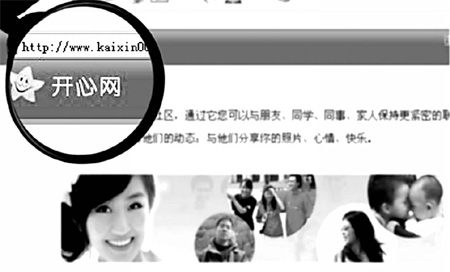What's in a Name? Probably Millions!

It is often easy for Internet companies to copy other website designs, content or even business models. But that approach can bring legal problems with equal ease.
That was the case when Kaixin001.com, a popular Chinese social networking website, brought an unfair competition lawsuit last month against Beijing-based online entertainment company Oak Pacific Interactive, which launched a competing service in October with a very similar name - Kaixin.com.
The website claims Oak Pacific stole its name and misled users, and asks Oak Pacific to stop using the name and pay 10 million yuan in compensation.
"We admire fair competition, but I don't think anyone can bear stealing," said Liu Qian, vice-president of Beijing-based Kaixinren Technology, the developer of Kaixin001.com. "We will use every means to protect our rights."
Established in March last year, Kaixin001.com is now one of China's most popular social networking websites, with 20 million registered users and 700 million page views by April. It enables friends to play online games similar to Facebook's "Parking War" and "Friends for Sale", which helped the website gain great popularity among Chinese white collar workers who have a great deal of idle time at work.
In order to profit from its traffic, Kaixin001.com started selling in-game advertisements on the website, attracting advertisers including General Motors, Sony Ericsson, Motorola, Lenovo, L'Oreal and Lancome.
That put it in direct competition with Oak Pacific Interactive, which owns China's largest social networking website Xiaonei.com. Established in 2005 and acquired by Oak Pacific in 2006, Xiaonei.com attracts mostly college students among its 70 million registered users.
In an effort to stop losing those users when they leave college and go to work, Oak Pacific decided in October to launch the website Kaixin.com that targets white collar workers. In its early stages, the new website had similar design and game applications to Kaixin001.com and quickly attracted a great number of users, in part because of its similar domain name.
Although criticized by the media as copying kaixin001.com, Oak Pacific refutes the charge it is a copycat because it legally purchased the domain name Kaixin.com and worked out many of its own applications offered on the website.
"A domain name is just the door of a social networking site. People revisit our website because it has a good reputation for games," Xu Chaojun, vice-president of Oak Pacific Interactive, told China Business Weekly in an earlier interview.
"Kaixin.com is not a copycat! We will fight for our right and reputation in court," he said.
Industry experts note it is very difficult to show whether Kaixin.com copied the designs and service applications from Kaixin001.com as Internet companies often use similar designs and provide similar applications as long as they are popular. But infringement on brand and domain names is easier to identify.
Li Yunde, a lawyer for Kaixin001.com, said its competitors violated anti-malfeasance competition laws when it named the website Kaixin.com "to mislead netizens". He said Oak Pacific stole the brand influence of Kaixin001.com, causing the website to suffer huge economic losses.
Domain name battle
According to Chinese regulations, domain names can be registered by anyone and ownership belongs to those who register first. After the Chinese government opened its domain name registration to individual applicants in 2000 and made it a business, the cost of registration has declined. In some cases the registration fee for a domain name can be as low as 1 yuan.
Those moves, together with the rising importance of the Internet, led to a flood of domain name registrations. Some individuals even made large profits by registering "promising" domain names and then selling them to companies or organizations.
It was reported that Kaixin001.com's executives declined an offer from the private owner of Kaixin.com, Fu Zhengjun, to sell the domain name for a 2 percent stake in Kaixin001.com.
"I wanted to talk to them for further cooperation but they refused," said Fu on a TV program aired by Beijing Television. Fu said he then sold the name to Oak Pacific at a price of at least "3 million yuan".
Cheng Binghao, founder and chief executive of Kaixin001.com, said in a recent interview with local media that his company couldn't afford kaixin.com at the time due to a lack of capital. "I'm sorry we couldn't afford the name at that time," said Cheng. "But what I want to do now is to get back our brand name."
(China Daily 06/08/2009 page9)
2013-07-17 Print
Print